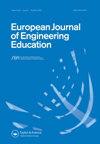Application of gamified virtual laboratories as a preparation tool for civil engineering students
IF 2.8
Q2 EDUCATION & EDUCATIONAL RESEARCH
引用次数: 0
Abstract
Practical laboratory sessions are essential for engineering education, demanding efficient use of limited time. In recent years, Virtual Reality (VR) technologies have introduced Virtual Laboratories (VLs), offering the potential to enhance students’ educational experience. Despite their potential, VLs are rarely utilised in civil engineering education. This research investigates the effectiveness of a gamified VL designed to simulate a concrete laboratory, aimed at better preparing students for experiments. A quasi-experimental study divided 92 students into control and experimental groups using cluster sampling. The control group received traditional lab training, while the experimental group engaged with the VL training environment. The results demonstrate that students using the VL spent significantly less time in the physical lab, exhibited improved competence in navigating lab setups, posed fewer questions about experimental procedures, and required less assistance from lab assistants. Notably, VL users spent 16% less time in the physical lab and needed fewer interventions from lab assistants. This study highlights the potential of VLs as potent tools for preparing engineering students for traditional lab sessions. Post-experiment surveys revealed a strong willingness among students in the experimental group to use VLs in future similar lab sessions, emphasising the positive impact of integrating VLs into engineering education.游戏化虚拟实验室作为土木工程专业学生备课工具的应用
实践实验课程是工程教育必不可少的,要求有效利用有限的时间。近年来,虚拟现实(VR)技术引入了虚拟实验室(VLs),为提高学生的教育体验提供了潜力。尽管VLs具有潜力,但很少在土木工程教育中使用。本研究调查了一个游戏化VL的有效性,旨在模拟一个具体的实验室,旨在更好地为学生准备实验。准实验研究采用整群抽样的方法,将92名学生分为对照组和实验组。对照组接受传统的实验室训练,实验组接受VL训练环境。结果表明,使用VL的学生在物理实验室中花费的时间明显减少,在导航实验室设置方面表现出更高的能力,对实验过程提出的问题更少,需要实验室助理的帮助也更少。值得注意的是,VL用户在物理实验室花费的时间减少了16%,需要实验室助理的干预也减少了。这项研究强调了VLs作为为工程专业学生准备传统实验课程的有力工具的潜力。实验后的调查显示,实验组的学生有强烈的意愿在未来类似的实验中使用虚拟语言,强调了将虚拟语言融入工程教育的积极影响。
本文章由计算机程序翻译,如有差异,请以英文原文为准。
求助全文
约1分钟内获得全文
求助全文
来源期刊

European Journal of Engineering Education
EDUCATION & EDUCATIONAL RESEARCH-
CiteScore
7.30
自引率
13.00%
发文量
64
期刊介绍:
European Journal of Engineering Education is published six times a year in print and electronic editions and provides an essential forum for dialogue between researchers and specialists in the field of engineering education, at European and worldwide levels. European Journal of Engineering Education is the Official Journal of SEFI, the Socièté Européenne pour la Formation des Ingénieurs (the European Society for Engineering Education). SEFI is a non-governmental organization whose aims are to develop information about engineering education, to improve communication and exchange between professors, researchers and students and to promote cooperation between the various institutions concerned with engineering education.
 求助内容:
求助内容: 应助结果提醒方式:
应助结果提醒方式:


